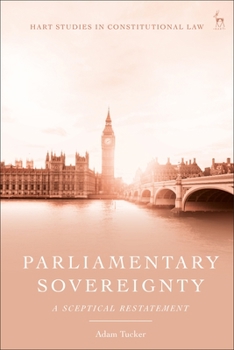Parliamentary Sovereignty: A Sceptical Restatement
This book articulates and defends a sceptical general account of parliamentary sovereignty.
It challenges the orthodox approach to this fundamental doctrine by making three key heretical claims. First, there are some laws that Parliament cannot make. Second, there are several ways in which primary legislation can be overridden or set aside by institutions other than Parliament. And third, Parliament has the power to bind itself as to the substance of future legislation. All three positions are developed using arguments which depend on existing legal materials and are compatible with the normative underpinnings of the doctrine of parliamentary sovereignty. The book combines theoretical and doctrinal analysis. The theoretical part of the book situates Parliament's authority to legislate in the broader context of an examination of constitutional and political authority. It develops a conception of the ways in which competing views on the scope of Parliament's legislative authority are mediated into law. The doctrinal part of the book reconsiders Parliament's legal position. It proposes a novel conception of Parliament's power to bind itself, rooted in the idea of commitments. It defends the existence of a judicial power to impose narrowly conceived freestanding limits on Parliament's law-making authority, rooted in the rule of law. Finally, the book examines the challenges posed to parliamentary sovereignty by the executive, Parliament's internal procedures and the devolved legislatures.Format:Hardcover
Language:English
ISBN:1509968954
ISBN13:9781509968954
Release Date:April 2026
Publisher:Hart Publishing
Length:288 Pages
Weight:1.00 lbs.
Dimensions:1.0" x 6.1" x 9.2"
Related Subjects
LawCustomer Reviews
0 rating





